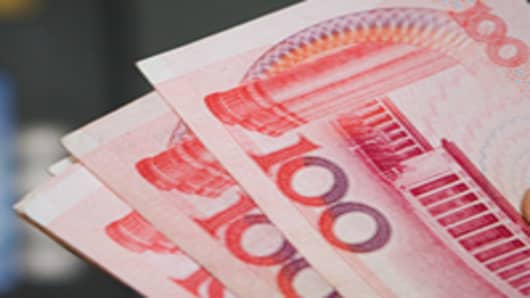The yuan’s recent decline, the first in seven years, is raising eyebrows among U.S. politicians and sparking concerns that the weakening currency could trigger another round of nasty bickering between Beijing and Washington.
The renminbi has fallen one percent against the U.S. dollar so far this year, after appreciating 22 percent since 2005 when China abandoned the currency’s peg to the greenback. Analysts say the development could further the case for U.S. lawmakers, who have long held the belief that China is keeping its currency artificially cheap, giving the country’s own exports an unfair advantage.
Already, the rumblings have begun. Mitt Romney, the U.S. Republican presidential candidate, has dragged in the issue in the race for the White House, declaring to voters that the U.S. will adopt a tougher stance and accuse China of currency manipulation.
Frank Lavin, former Under Secretary of Commerce for International Trade from 2005 to 2007, said the yuan issue “is not going away” and will “surface intermittently in these final three months” of the U.S. presidential elections.
“There is a view in a segment of the electorate that the Chinese have artificially manipulated their currency to gain an unfair advantage,” Lavin said. “In a political season, this view can take on a populist tone and be turned into general criticism of the Obama administration.”
According to Frank Ching, a professor of Hong Kong University who specializes in Sino-U.S. relations, “The value of the yuan is much less of an issue now than previously, but in the current highly-charged political atmosphere in Washington, politicians are likely to continue hammering at it.”
Market watchers say the gains made by the yuan over the years may have gone some way in soothing the tensions, but the issue will remain a sticking point so long as China maintains a significant trade surplus with the United States. While China’s trade surplus with the U.S. narrowed from a record $295 billion in 2008, it still stood at $160 billion as of last year.
“As long as China runs a trade surplus with the U.S., there will be U.S. politicians claiming this is because of an overvalued (U.S.) currency and that domestic manufacturing should be protected from ‘cheap’ Chinese imports by a much bigger yuan appreciation,” said Ray Attrill, head of FX strategy at NAB.
Slowing Growth Comes in the Way
But complicating the issue is a slowing Chinese economy, which has been partly blamed for a softer yuan. There are questions about how much the further loosening of China’s foreign exchange rate system, which U.S. lawmakers have called for, can be effective in weakening the yuan.
"I think one of the greatest ironies in the world is that if they allowed the renminbi to float at this point, it may actually weaken because if you look at the dynamics of the Chinese economy, there's a tremendous amount of over-leverage and lots of mal-investment," Boris Schlossberg, Managing Director of BK Asset Management told CNBC Asia earlier this month.
According to Attrill of NAB, the yuan’s appreciation has been tempered by the bursting of China’s property market bubble, which removed one of the sources of hot money inflows.
“So the weakness is partly a function of foreign hot money getting out, and partly domestic investors seeing value in investing overseas and, to the extent the capital account remains quite porous, managing to get their money out,” he said.
Still, most analysts agree that the yuan is “quite a heavily managed currency” and in practice, China can still steer it however they wish. The question is whether they are willing to do that at the expense of growth.
According to Mitul Kotecha, Head of FX Strategy at Credit Agricole, “Beijing is capable of pushing the currency higher via setting stronger fixings, and even interventions, but they do not want to as policy focus is now on growth and they need to help exporters .”
- By CNBC's Li Anne Wong



